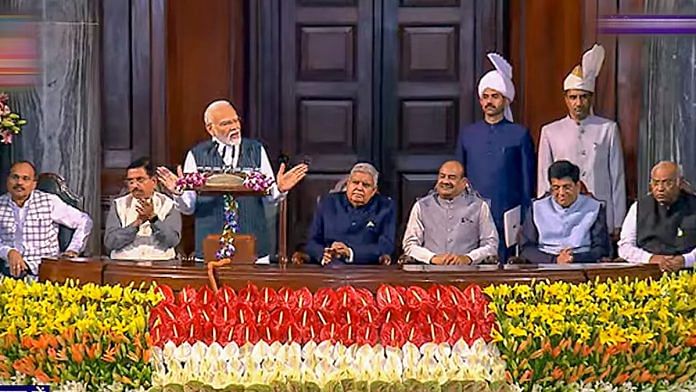The passing of India’s women’s reservation Bill in both houses of Parliament is a powerful and emotional testament to the nation’s unyielding commitment toward gender equality and nurturing women-led progress. This landmark achievement comes after an arduous legislative journey spanning 27 years. It began in September 1996, when the Bill was first tabled in Parliament under the leadership of former Prime Minister HD Deve Gowda. Successive administrations made earnest attempts to transform this Bill into law. The United Progressive Alliance government, for one, succeeded in its attempt to get the Bill approved in Rajya Sabha in 2010. However, the absence of political will and consensus stalled its progress.
Emotions ran high when the Narendra Modi government’s women’s reservation Bill was passed in Lok Sabha on 20 September. Opinions flowed like a torrent on the momentous occasion, and the reactions were nothing short of intense. The Bill received unanimous support from the Rajya Sabha too. There were no abstentions and no negative votes.
Every political party wants credit for the legislative achievement – both eager to bask in its glory and nitpick perceived flaws. The timing of the Bill, less than a year before the 2024 Lok Sabha election, has raised eyebrows. It is crucial to remember that the implementation of women’s reservation, contingent on the next census and delimitation drive, might only come into force after India goes to polls. But irrespective of immediate motivations or circumstances, the Bill stands as a monumental milestone in our nation’s democratic journey.
The most significant critique of the Bill revolves around the issue of inclusion. Activists supporting Other Backward Classes (OBC) expressed their discontent with the fact that the Bill only provides sub-reservations for Scheduled Caste and Scheduled Tribe women while sidelining those from OBC communities. This demand for OBC inclusion appears just and well-founded. However, another aspect of the debate revolves around the inclusion of Muslim women.
Also read:
Entitled move?
All India Majlis-e-Ittehadul Muslimeen (AIMIM) MP Asaduddin Owaisi is calling out the Bill for excluding OBC and Muslim women, even voting against it with fellow party MP Imtiaz Jaleel. In this context, it becomes important to inquire into what efforts he and his party have undertaken to promote the inclusion of Muslim women beyond endorsing their hijab. It also becomes important to raise a pertinent question: If we fail to grant women within our community equal opportunities and treatment, how can we expect them to emerge as leaders in the broader public sphere?
Furthermore, one must question the rationale behind the demand to specifically include Muslim women in the Bill, as it appears rooted in a communal mindset. If including women from minority communities is the prime concern of critics like Owaisi, they could have thought about extending their request to women from Christian, Jewish, Sikh, Buddhist, and Zoroastrian backgrounds. However, it is evident that broad inclusion is not their primary focus. Seeking a sub-quota exclusively for Muslim women without presenting any compelling reasons to support this stance is an entitled move.
As a woman, I can’t help but feel elated about the passage of this Bill in Lok Sabha and Rajya Sabha. But, as a Pasmanda Muslim woman, I find it crucial to emphasise and advocate the need for more space and representation for women from my community. While they do receive some form of sub-quota through ST reservation, it’s essential to acknowledge that a significant portion of Pasmanda women fall under the OBC category. Therefore, I sincerely hope that the government considers including OBCs. It’s a concern born out of the realisation that if even Pasmanda men struggle to reach legislative positions, ensuring the representation of Pasmanda women in Parliament will pose an even bigger challenge.
The positive aspect of this Bill is that it received support from almost every political party. However, it provides the Bharatiya Janata Party (BJP) with an advantage over their counterparts as their vision of inclusion and reform encompasses all communities, including Muslims. This contrasts with the Congress, which has faced criticism for its poor handling of issues like the Shah Bano case. The BJP has taken a significant step in this regard by introducing the Triple Talaq Bill, which marked a pivotal moment in securing legal rights for Muslim women. There’s an opportunity for Congress to take note and learn from this approach.
Amana Begam Ansari is a columnist and TV news panelist. She runs a weekly YouTube show called ‘India This Week by Amana and Khalid’. She tweets @Amana_Ansari. Views are personal.
(Edited by Zoya Bhatti)



